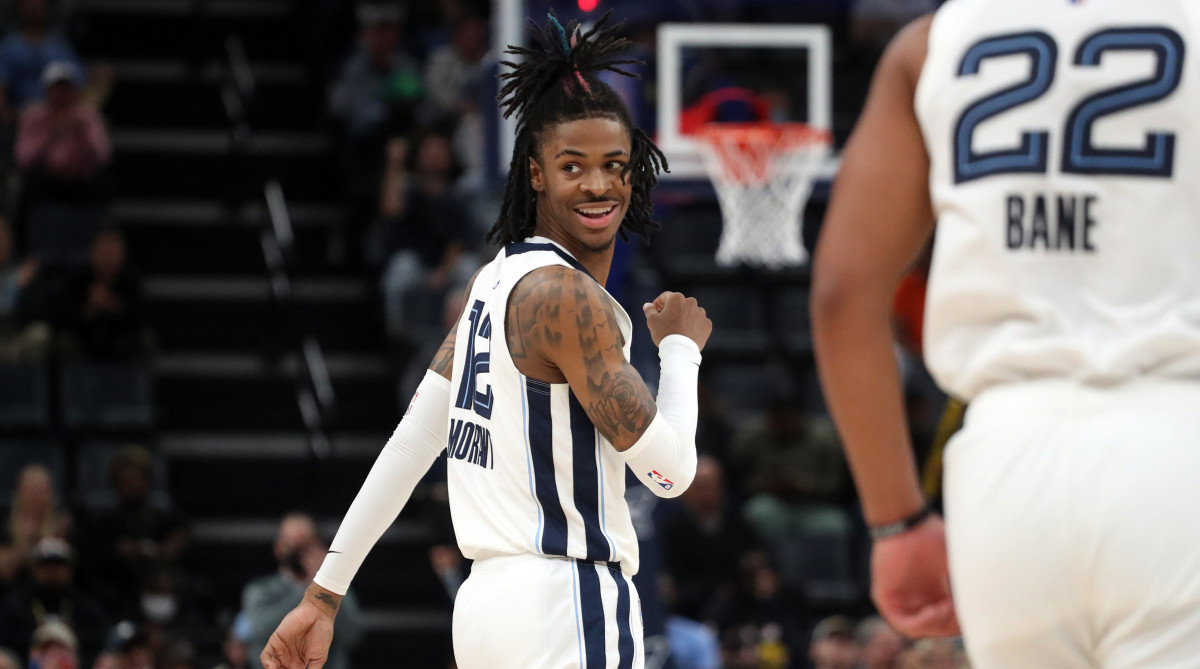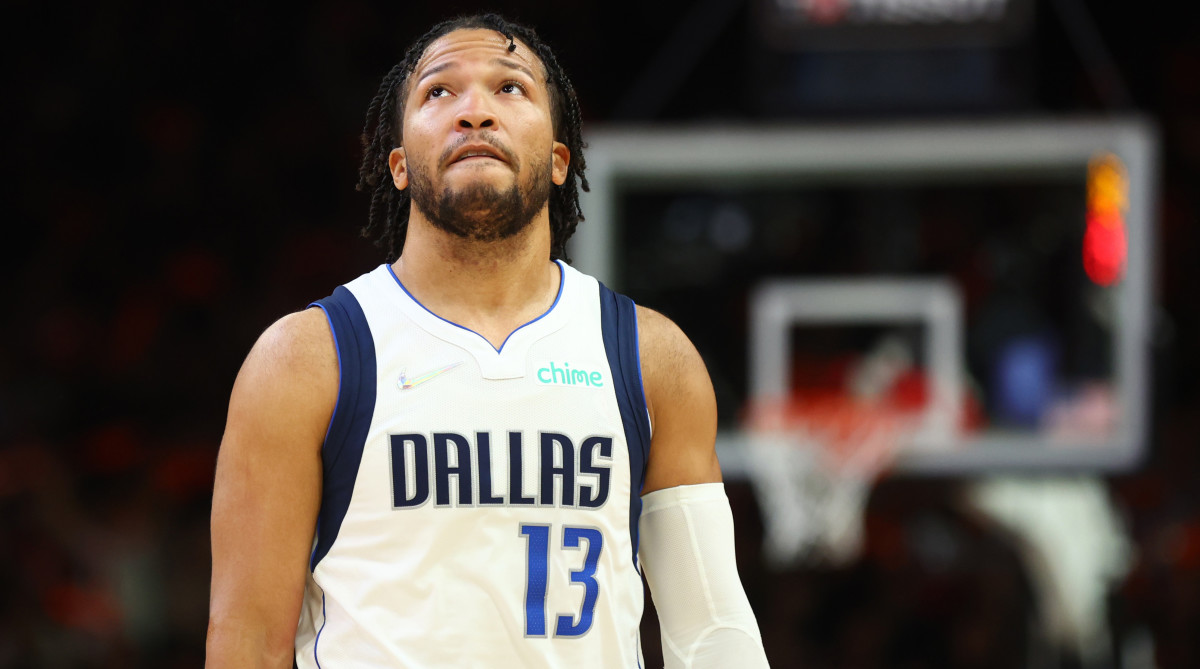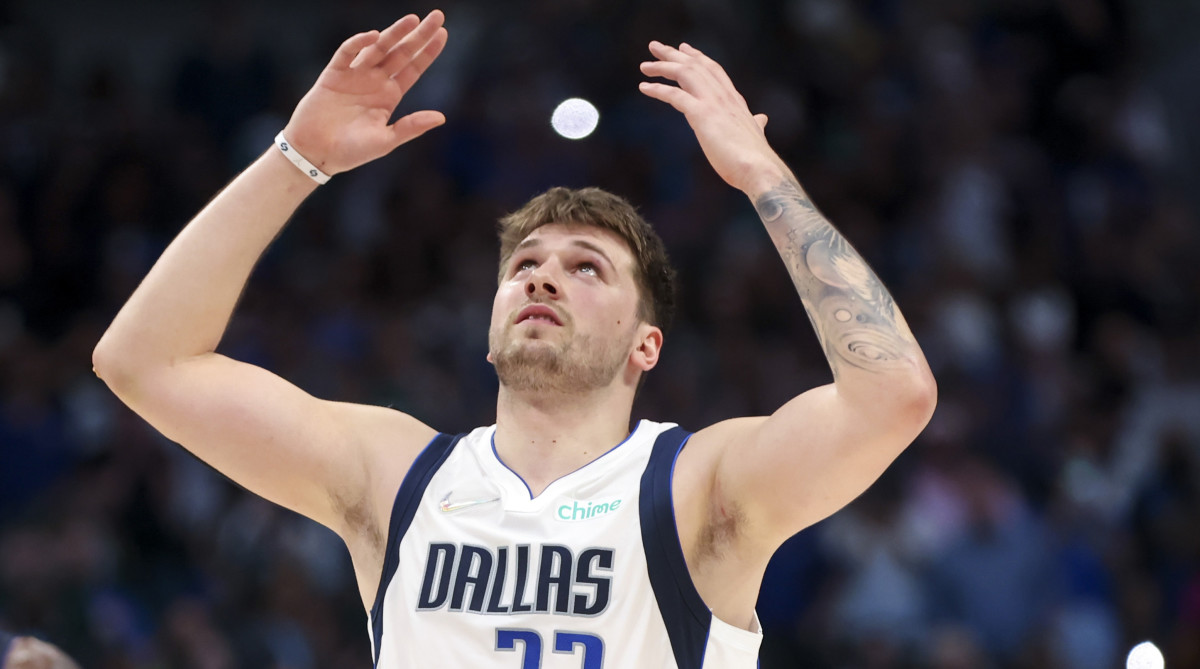Early Winners and Losers of NBA Free Agency
The first couple days of free agency have been packed with historic signings, blockbuster trades and one league-altering trade request. Here are some of the standout winners and losers … so far.

WINNERS
Every star who got paid
Congratulations to Karl-Anthony Towns, Devin Booker, Bradley Beal, Ja Morant, Zach LaVine, Zion Williamson and Nikola Jokic—who just signed the largest contract in NBA history—on bagging supermax extensions. Not all the teams paying these contracts deserve a place in the “winners” category for giving them out, though. (Washington, what are you doing, seriously.)
There isn’t anything too deep to say beyond that besides “it would be nice to sign a $200-plus million contract someday,” so good for each one of these dudes.
Brooklyn Nets*
Free agency started with a bang when Kevin Durant told Nets owner Joe Tsai that he no longer wants to play basketball in Brooklyn. Judging from their decision to trade a first-round pick for Royce O’Neale, the Nets were either caught entirely off guard by Durant’s trade request or confident they can still win now with whatever they get for him. So, without knowing who/what exactly will be in that lucrative package—Anthony Davis? Deandre Ayton and Mikal Bridges? Paul George and … Brandon Boston Jr.? 19 first-round picks?—it’s somewhat reassuring that the Nets retained Patty Mills and Nic Claxton and then added O’Neale, a solid 3-and-D wing who can help address some of the issues that plagued them last season. (Losing Bruce Brown to the Nuggets would hurt more had O’Neale not been acquired.)
Ben Simmons and Joe Harris will presumably contribute at full strength, as well, and they’ll get something for Kyrie Irving, assuming he doesn’t retire or get stretched. It’s possible the Nets may not be screwed in the short- or long-term after all. A lot can change over the next couple weeks, but on a day that began with apocalyptic overtones, Brooklyn’s situation could be less rocky than it initially appeared.
*There’s a good chance this ages poorly.
Houston Rockets
Alright, now put all those nice things written above about the Nets to the side. As owners of Brooklyn’s first-round picks in 2024 and ’26, with rights to swap in ’25 and ’27, Houston should be smiling. The last time a team owned that much Nets draft capital, it landed Jaylen Brown, Jayson Tatum and another pick that was eventually included in a trade to get … Kyrie Irving.
With Jalen Green, Jabari Smith Jr. and several other young talents already sprinkled throughout the Rockets’ roster, the future looks exceptionally bright in Houston. The Rockets also signed Jae’Sean Tate to a three-year, $22.1 million, which is an absolute bargain that made me do a double take the first time I saw it. Plus there’s a team option! To make a quick comparison of average annual salaries, that’s about $10 million per year lower than what the Thunder will pay Lu Dort. Tate is four years older but as good if not a little better right now.
Lu Dort
Speaking of Dort, his journey from undrafted folk hero to $87.5 million lord is the stuff of legend. Shooting splits aside, he’s just so fun to watch. Few are harder to screen; Dort’s commitment to staying attached to his man when a pick comes is borderline inspirational. For the Thunder to reward the 23-year-old with this much money, coming off the draft they had, with Shai Gilgeous-Alexander locked up, Josh Giddey running point and Chet Holmgren holding down whatever position he’ll play, speaks to the direction they’re headed and how they want to build to get there. Everyone wins. But especially Dort.
Danny Ainge
Rudy Gobert is an acquired taste. He’s still owed about $170 million over the next four years, and Thursday morning there were maybe three or four teams sincerely interested in giving up valuable stuff to get him. The Jazz had little leverage; heading into this offseason, the entire NBA knew the Jazz wanted/had to eventually trade him. (I personally would’ve shopped Donovan Mitchell instead but 25-year-old All-Star guards are pretty much always prioritized over 30-year-old All-Star big men.) Despite all that, Jazz basketball’s new CEO, Danny Ainge, still managed to rope the Timberwolves into a truly historic asset heist.
Before we go any further, this characterization doesn’t necessarily mean Minnesota “lost” the trade. Coming off a promising season with two franchise cornerstones who still aren’t in their primes, the Wolves just landed one of the best defenders in NBA history, an elite rim protector who will make life so much easier for Anthony Edwards and Karl-Anthony Towns. For all his shortcomings on offense (where Utah had the league’s first-and fourth-best attacks over the past two years), Gobert’s teams always defend well enough when he’s on the court to comfortably make the playoffs. Nobody raises an organization’s floor like Gobert; just thinking about lineups that have Towns, Gobert and Jaden McDaniels (who they wisely kept in this deal despite Ainge’s best efforts to pry him away) in them is making me hyperventilate.
But they got crushed in the negotiation by the same architect of two separate successful eras in Boston. If anyone in the NBA knows how to kickstart a rebuild, it’s Ainge. For Gobert, Utah will get Patrick Beverley, Malik Beasley, Leandro Bolmaro, Walker Kessler (an incoming rookie center who was just named the best defender in college basketball), Jarred Vanderbilt, unprotected first-round picks in 2023, 2025 and 2027, a pick swap in 2026 and a top-five protected first-round pick in 2029.*
This is a freaking haul for a Jazz franchise that has Mitchell, a first-round pick in 2023 (courtesy of Thursday’s Royce O’Neale trade) and all its own first-round picks minus a top-10 protected selection in 2024 that will go to the Thunder if it’s No. 11 or higher (which doesn’t seem likely). Without Gobert, next season Utah will become one of the worst teams in the Western Conference. And before Mitchell’s current contract expires, there’s a decent chance Ainge flips him for another desirable package.
Regardless, this was a masterful job by Ainge and the rest of Utah’s front office to squeeze every last drop of value from a center who already gave that team so much. They’re set up for great things down the line. While the Timberwolves suddenly have immense pressure to win big as soon as they possibly can, despite their most important player being only 20 years old.
*For the sake of comparison: Back in 2019, the Clippers sent Shai Gilgeous-Alexander, Danilo Gallinari, five unprotected first-round picks and two pick swaps to the Thunder for 29-year-old Paul George (and 28-year-old Kawhi Leonard, who wasn’t going to Los Angeles without another star).

New York Knicks
I’m not a huge fan of Jalen Brunson’s contract and think the Knicks should’ve taken a different approach on draft night. But when you shed all that salary and then get your No. 1 target, it’s not a loss. So, even though it may be a mild overpay, the Knicks landed a quality talent at a position of need. Good for them. The actual real reason I want to put them here, though, is Isaiah Hartenstein, who New York snagged with a fully guaranteed two-year, $16 million contract.
Only 24 years old, Hartenstein was one of the best backup bigs in the league last season, and he’ll be terrific in that same role behind Mitchell Robinson (who just signed a four-year, $60 million deal). Hartenstein is a versatile defender who can protect the rim, switch and plug holes in a drop. He was one of three free agents I labeled “under the radar” earlier this week, and with Nerlens Noel gone to Detroit in a salary dump, the Knicks upgraded in an impressive way. Brunson and RJ Barrett have a new dribble handoff partner they’ll really enjoy playing with.
Denver Nuggets
I was initially tempted to mark Denver down as a loser when they signed DeAndre Jordan. (Unless it’s an elaborate ploy to juice up Jokic’s on/off numbers and help him win a third-straight MVP award, nothing about that decision makes sense.)
But the Nuggets recovered quickly. Grabbing Bruce Brown with a mid-level exception was a boon. The inverted pick-and-rolls he’ll run with Jokic will be a blast, and the Nuggets needed a bit more defensive toughness/versatility along the perimeter. Brown and the newly acquired Kentavious Caldwell-Pope should help a lot.
(Side note: Hindsight is 20/20, but Denver’s questionable-at-the-time decisions to give Jamal Murray and Michael Porter Jr. five-year max rookie extensions take them out of the running on a potential Durant trade, thanks to rules in the CBA that disallow one team from acquiring multiple players on those contracts via trade. Again, I know this criticism is harsh but do wonder if any teams will alter their approach here going forward, to give themselves a bit more flexibility.)
Philadelphia 76ers
Speaking as a devoted follower of the Daryl Morey/James Harden-era Rockets, Philly’s decision to use its mid-level exception on P.J. Tucker was brilliant. For a roster that by their own admittance needed to get mentally and physically tougher after last year’s disappointing end, Tucker singlehandedly checks off all those boxes. His teams habitually make deep playoff runs for a reason. He is tenacious and fearless, and can still knock down open corner threes and guard multiple positions on the other end.
Danuel House Jr. is a nice bonus and it feels like only a matter of time before Morey reunites those three with Eric Gordon. Harden’s contract is unresolved, but most reporting indicates they’ll bring him back on a short-term deal that’s below the max. Tobias Harris and Matisse Thybulle keep floating through the rumor mill. Regardless of what happens there, the Sixers have a roster that’s able to win the title.
Boston Celtics
They added Malcolm Brogdon and Danilo Gallinari without losing a single member of their playoff rotation. They head into next season as the best team in the Eastern Conference. If they extend Grant Williams to a team-friendly contract and sign a backup big like Thomas Bryant to the veteran’s minimum sometime over the next couple months, it’ll be hard to think of any way their offseason could’ve gone much better. (Boston also still has a very large trade exception to play with.)

LOSERS
Dallas Mavericks
Brunson’s departure was a tough blow, even if the team that signed him away paid almost twice the amount Dallas could’ve had him at five months ago. Brunson on the Mavericks is not Brunson in New York. The role is different. The fit is different. Luka Doncic and Julius Randle are not the same. Mavs GM Nico Harrison called Brunson a “top priority” once free agency began, so to lose him for nothing stings, even at a four-year, $104 million cost.
Their plan is to replace Brunson’s production with Spencer Dinwiddie, a healthy Tim Hardaway Jr. and, reportedly, Goran Dragic. (Dallas has no interest in trading for Kyrie Irving, per NBA reporter Marc Stein.) Coming off its first taste of playoff success in over a decade, it’s hard to see how Dallas got better Thursday. And it’s not like there will be some major opportunity to spend next offseason, either. (If they stay lean, the Mavs will have max cap room during the summer of 2024; Doncic will be halfway through his max extension by then.)
Elsewhere, the Mavs used almost all of their taxpayer mid-level exception on JaVale McGee, a perplexing decision given their need for another ball-handler and the fact that McGee just fell out of Phoenix’s rotation against Dallas in the playoffs. The 34-year-old journeyman center thinks he’s going to start at the five despite, as of this writing, Dwight Powell and Christian Wood also being on this roster. (Also: Maxi Kleber is better than all three of them and going small with Dorian Finney-Smith up a position just worked wonders in the playoffs.)
Smooth negotiations between owners and players on the next CBA
Kevin Durant’s trade request with four guaranteed years left on a $198 million contract extension that was signed last August might be a tipping point in a growing league-wide issue that concerns stars who grab as much money as they can, then backtrack on the contractual commitment to stay with the organization that agreed to give it. We just saw a standoff between Ben Simmons and the Sixers that was public and ugly for several months. Neither side benefited.
Durant’s own departure from Brooklyn may not seem as out of step (considering the talent/achievement disparity), but it’s hard not to think of the precedent it would set. Sure, Durant is one of the dozen greatest players who’s ever lived, coming off a season in which he averaged 30 points per game with the 11th-highest true shooting percentage in the league.
But if you’re another owner watching this play out from afar—especially one in a small market—you’re considering what might happen if your own franchise player came forward with a trade demand 10 months after you came to terms on a humongous, long-term contract extension. (It’s only a matter of time before Bradley Beal trade rumors start to percolate, now that he got the $251 million deal he waited around for.)
Durant may be an outlier, but if some type of restriction isn’t established in the next Collective Bargaining Agreement (which can be opted out of in December), he—along with Simmons—may kick off a pattern that isn’t healthy for the NBA. If you gave some of the league’s other owners truth serum, I bet several would say they’re rooting for Joe Tsai to hold his ground and force Durant to hold up his end of the pact they agreed to last August.
Sacramento Kings
The only team with a worse defense since 2020 is Portland. Instead of taking a step toward solving this problem by using their full mid-level exception on someone who can play defense, the Kings gave it to Malik Monk, a bad defender. Contrast that with those Blazers, who took their own mid-level exception and signed Gary Payton II, one of the best defenders in the NBA and a player who just won a championship functioning in new Kings head coach Mike Brown’s defensive system.
The Kings didn’t have a good offense last year and Monk just had a breakout season shooting the ball. But how much of his production will fall back to Earth on a team that doesn’t have LeBron James? Monk's effective field goal percentage went from 62.1% with James to 54.7% without him last year. He’s good friends with De’Aaron Fox, which is nice. But there were better options available to assuage a more pressing need.
Kevin Huerter makes sense and was worth the protected first-round pick Sacramento sent to the Hawks for him. He’s only 24, a useful two-way player who can stretch the floor, create for himself inside the arc and run a nice second-side pick-and-roll. (Pulling Donte DiVincenzo’s qualifying offer was a curious decision, especially after the Warriors gave him part of their taxpayer mid-level exception.)
Anyone who still believes Klutch doesn’t run the Lakers
The Lakers signed Damian Jones, Troy Brown Jr., Juan Toscano-Anderson and Lonnie Walker IV in the first 12 hours of free agency. The last three are represented by Klutch. This fact isn’t illegal or surprising, and it’s hard to be too critical of who L.A. brings in, given its limited resources and how the market has shaped out. But when you favor players who belong to one agency, how can you build the best team possible?
Milwaukee Bucks
The Bucks re-signed Bobby Portis, Jevon Carter and Wesley Mathews, and Pat Connaughton opted into his contract. None of those players are on worrisome contracts and it’s not that Milwaukee can’t win the title with them supplementing Giannis Antetokounmpo, Khris Middleton and Jrue Holiday. But there’s little margin for error right now, which makes the decision to use their taxpayer mid-level exception on Joe Ingles—a 34-year-old who tore his ACL six months ago—highly questionable even in a thin marketplace.
Gary Harris would’ve been great but the Magic reportedly gave him a two-year, $26 million deal. (It’s likely a delayed sign-and-trade, so instead of losing Harris for nothing Orlando will try and trade him in-season to get back some type of future asset.) Maybe they land T.J. Warren at the veteran’s minimum. But instead of Ingles, what about someone like Amir Coffey, a 25-year-old who’s not bad and was just signed to be the Clippers’ 12th man. Or Otto Porter Jr., who started the last three games of the Finals! Maybe Ingles is back to his old self and all that veteran savvy pays off. If not, and the Bucks fall short, that front office deserves criticism.
More NBA Coverage:
